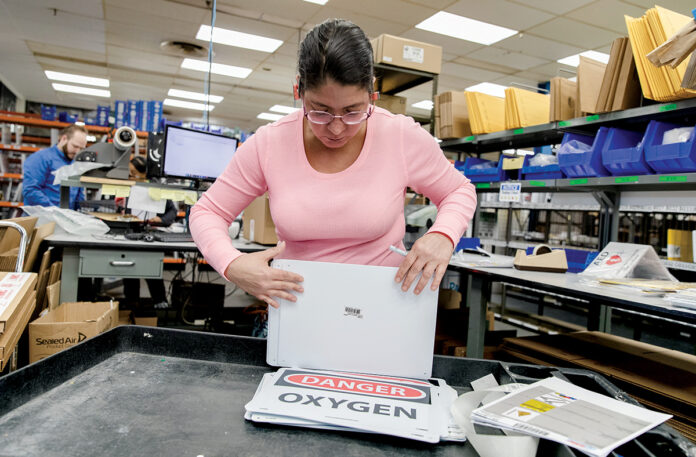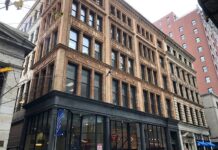
PBN MANUFACTURING AWARDS 2020 | Supply Chain Excellence: National Marker Co.
THE DAYS THAT Andrew Ellison, director of operations at National Marker Co., wears a tie to work are the best, not because the 86 employees are fashion hounds but rather because the tie signals that 95% of orders were shipped on time that day.
Most days are good ones at the 80-year-old sign-making business based in North Smithfield.
National Marker creates and sells signs, labels and tags – many including safety warnings required by the Occupational Safety and Health Administration – to facilities and job sites all over the country. Products range from tiny tags to big banners. Safety or sales displays also are produced by NMC, 57% of which are custom orders.
The company shipped 115,676 sales orders last year, and had a 58-day streak in which 95% of its orders were shipped on time or early. President Michael Black said the company’s goal is to get half of all orders out in one day, and 95% out in two days.
National Marker said it has increased annual revenue by $3.8 million since 2016. It has decreased quote times and increased efficiency, all while sustaining record growth and tripling its size over the past eight years, Black said.
Two factors challenge the company’s efforts to finish work and deliver it fast. One is that most orders are custom designs. The other is that orders are from customers who want their product instantly.
“This industry is based on velocity,” Black said. NMC stands out for fast productivity via computer applications, efficient production lines, a high degree of automation, use of lean manufacturing methods, and giving lots of authority and responsibility to line workers.
“Our fast turnaround is our competitive edge in the industry,” Black said.
In recent years, the company has increasingly adopted automation software, which allows it to move 70% of work previously done manually directly to printing presses without the need for any human handling.
As a result, the production line can take an order and produce it in minutes instead of hours or days. It leads to an increase in the number of skilled jobs to manage the automation system, in place of entry-level, repetitive work.
A tight supply chain for raw materials such as aluminum, various plastics, ink and other elements is also critical. NMC has a stable of preferred suppliers, most within a 40-mile radius, and their trucks travel to and from North Smithfield multiple times a day.
Although the company’s purchasing staff recruits and builds relationships with suppliers, daily orders for raw materials do not necessarily leave the building from a central command; they also go out from people with their hands on the process.
In the printing operation, Black said, “someone may be pulling raw materials for a job using the visual Kanban system. If they need to reorder, they may simply walk to a computer and send an email to a supplier.” Kanban is a system similar to managing work as it proceeds through a process. This lean technique places an emphasis on continual delivery.
“The fact that we don’t know what we are going to print [in a given day] falls onto the supply-side chain,” Black said.
This method places a lot of responsibility on the line workers. “Operators don’t just produce product,” Ellison said. “We are giving them accountability on the floor. People know what they need, and we empower them to run their part of the process.”
A similar degree of shared responsibility and accountability extends to suppliers. “We don’t necessarily go to the lower-priced vendor,” Black said. “We go with the one that understands our business needs and what we are trying to accomplish. We bring our suppliers inside our business. We are very transparent about what our needs are.”
Ellison and Black say they are not worried about tariffs and the country’s strained relationship with China. A few years ago, when tariffs on steel and aluminum were imposed, “we added some suppliers and went back to the manufacturing side and looked for more efficiencies,” Black said.
COVID-19 UPDATE
SIGN MANUFACTURERS ARE running full steam ahead this spring during the COVID-19 pandemic, none more than National Marker Co. President Michael Black gathered his executive staff in late February, doubled the size of the product-management group and braced for impact.
Among the company’s earliest actions was to contact suppliers and order raw materials in quantities that have held up through eight weeks of unprecedented levels of production.
“Our business has almost tripled” since the pandemic hit, Black said. “We have created 1,600 new products in 45 days.” NMC is selling products to new clients, he said, such as orthodontist offices. Starbucks contracted for $250,000 in signs to manage traffic for drive-thru customers. The company also has staggered its work schedule so that no more than 25 people are working on the floor at a time, out of a manufacturing crew of 70 people.
The company’s new catalog, titled “Pandemic Solutions,” is packed with various signs and labels about social distancing, including technology to project an “X” or words on floors or walls where taping may not be done.












